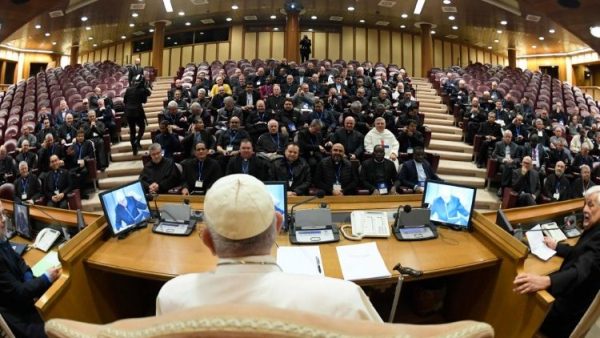Pope: The world needs consecrated persons as artisans of peace!
 Pope Francis addresses the Union of Superiors General at the conclusion of its Assembly with a reflection on what it means to be a peacemaker and on the importance of fostering synodality.
Pope Francis addresses the Union of Superiors General at the conclusion of its Assembly with a reflection on what it means to be a peacemaker and on the importance of fostering synodality.
To be peacemakers is a particularly urgent call in a world fragmented by wars and division. “It is the responsibility of each and everyone” Pope Francis said to the religious men gathered in the Vatican on Saturday morning, pointing out that it especially concerns consecrated persons.
In prepared remarks he noted that the theme of the just ended Assembly of the Union of Superiors General (USG) was “Called to be artisans of peace” and that reflection was based on the encyclical Fratelli tutti, the Pope spoke about the peace that Jesus gives and how it differs from the peace that the world gives.
In these times, when we hear the word "peace", we mainly think of a no-war or end-of-war situation, a state of tranquillity and well-being.
This, he said, “does not fully correspond to the meaning of the Hebrew word shalom, which, in the biblical context, has a richer meaning.”
The peace of Jesus
The Pope explained that the peace of Jesus is “first of all his gift, the fruit of charity, it is never a conquest of man.”
It is part of the “harmonious whole of relationships with God, with oneself, with others and with creation.
“Peace is also the experience of God's mercy, forgiveness and benevolence, which makes us capable in turn of exercising mercy, forgiveness, rejecting all forms of violence and oppression.”
This is why, he continued, the peace of God as a gift is inseparable from being builders and witnesses of peace. “It is founded on the recognition of the dignity of the human person and requires an order to which justice, mercy and truth inseparably contribute.”
A process that lasts over time
Encouraging the religious to become masters of the craft of peacemaking – “a craft to be practiced with passion, patience, experience, tenacity, because it is a process that lasts over time” – the Pope said it is not an industrial product that is achieved mechanically, but needs the skillful intervention of man.
“[Peace] is not built in series, by technological development alone, but requires human development. This is why peace processes cannot be delegated to diplomats or the military: peace is the responsibility of each and everyone.”
He urged those present to commit themselves to sow peace with daily actions, with attitudes and gestures of service, fraternity, dialogue, and mercy, and reminded them to unceasingly invoke the gift of peace in their prayers.
He told them to begin in their own communities, “building bridges and not walls within the community and outside it.”
“The world also needs us consecrated persons as artisans of peace!”
Synodality
The Holy Father went on to say that this reflection on peace leads to the consideration of another characteristic aspect of consecrated life: “synodality, this process in which we are all called to enter as members of God's holy people.”
Consecrated persons, he added, are especially called to participate in it, “since consecrated life is synodal by its very nature,” noting that its very structures (chapters, fraternal and canonical visitations, assemblies, commissions, and others that are proper to individual institutes) can foster synodality.
The service of authority
Thanking those who are offering their contribution in this journey, the Pope suggested that it could be necessary to review the way the “service of authority” is excercised, and he warned against authoritarian and sometimes despotic forms “with abuses of conscience or spiritual abuse that are also fertile ground for sexual abuse, because people and their rights are no longer respected.”
He spoke of the risk that authority may be exercised as a privilege, “for those who hold it or for those who support it,” and said this can foster a kind of anarchy, “which does so much damage to the community.”
The service of authority, he said, must be exercised in a synodal style, “respecting the proper law and the mediations it provides for, to avoid authoritarianism and privileges,” thus “favouring a climate of listening, respect for others, dialogue, participation and sharing.”
Consecrated persons, with their witness, can bring much to the Church in this process of synodality that we are experiencing. Provided you are the first to live it: to walk together, to listen to each other, to value the variety of gifts, to be welcoming communities.
Finally, Pope Francis upheld processes that allow for training and a generational renewal in the leadership of institutes and said “reorganisation or reconfiguration of the institute must always be done with a view to safeguarding communion.”
“In this regard, it is important for Superiors to be careful to avoid any person not being well occupied, because this not only harms the subjects, but also generates tensions in the community.”
Linda Bordoni
Source: vaticannews.va

